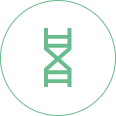Sequencing services
- Coverage options: minimum 30x.
- Library preparation: Illumina DNA Prep or Illumina DNA PCR-Free Prep, among others.
- Human WGS quality controls.
- The sequenced samples are subject to stringent quality control protocols, including integrity analysis and analysis of nucleic acid concentration and removal of impurities.
- In silico sex determination from sequencing data.
- We perform de novo assembly for reference-free genomes.
- Available on the NovaSeq 6000 sequencer (up to 28 complete human genomes per flow cell, 90 Gb/genome, >30x, 2×150 bp). Possibility to design experiments per flow cell and per line.
- Low coverage whole genome sequencing (lcWGS) will soon be available on both second and third generation sequencers.
In the case of non-human WGS, please note that we can customise the preparation and sequencing of the organism of interest. Please contact us without obligation. Other species: viruses, bacteria, vascular plants, other mammals, etc.
- Library preparation: Illumina DNA Prep with Exon 2.5 Enrichment.
- We also have experience in using the Agilent SureSelect HS2 XT (v8) exome capture kit and adapting protocols to other insert size options.
- Available on the NovaSeq 6000 sequencer for projects (up to 200 exomes at 100x with 2 x 100 bp reads).
Possibility to design experiments per flow cell and per lane. - Available on the NextSeq 550 sequencer for pilot projects and projects with a small number of samples or urgent projects (6 exomes at 100x with 2 x 75 bp reads).
- Our team has processed several thousand exomes from different national and foreign research centres and health institutions.
- mRNA
- We used oligo-dT beads to enrich the polyadenylated RNA molecules in the sample.
- Sequencing is available on the NextSeq 550 and NovaSeq 6000, with read lengths of 75 bp and 100 bp in
paired-end mode, respectively. - Library preparation protocols preserve chain information.
- Library preparation: Illumina TruSeq Stranded mRNA.
- Total RNA
- Total RNA allows the study of protein-coding RNA as well as long non-coding RNAs.
- Available read lengths are 75 bp and 100 bp in paired-end mode.
- Depletion of ribosomes in the library preparation minimises the presence of rRNA.
- Library preparation: Illumina Stranded Total RNA with Ribo-zero.
- sRNA
- Small RNA provides the ability to study RNA from 17 to 37 bp.
- Study of a wide variety of classes of regulatory RNAs.
- Library preparation: Illumina TruSeq Small RNA.
- Of interest for the creation of random DNA fragments from the sample, e.g. from a clinical or environmental sample, which are subsequently sequenced and assembled to reconstruct the complete sequence.
- Library preparation: Illumina Nextera XT and various options for long readings.
- Available on the MiSeq, NextSeq 550 and NovaSeq 6000 platforms. Also available on nanopore-based sequencers (MinION Mk1B/Mk1C and GridION x5).
- Possibility to design experiments per flow cell and per line.
- Of interest to identify DNA-associated protein binding sites in the genome. This technique combines chromatin immunoprecipitation (ChIP) with bulk sequencing of DNA to provide a detailed picture of the interaction between proteins and DNA.
- Library preparation: Illumina TruSeq ChIP Library Preparation Kit.
- Of interest to identify certain epigenetic modifications (e.g methylation) of DNA that play a role in the regulation of gene expression and other cellular processes.
- Library preparation: Twist Targeted Methylation.
- Available on NovaSeq 6000. Possibility to design experiments per flow cell and per line.
- Sequencing of whole genomes of bacteria and viruses.
- Sequencing of 16S rRNA.
- Preparation of libraries for viruses (e.g. SARS-CoV-2, influenza and respiratory syncytial virus): Illumina CovidSeq Test.
- Available on MiSeq, NextSeq 550 and NovaSeq 6000. Possibility to design experiments per flow cell and per line.
- Sequencing of whole genomes of bacteria and viruses.
- Sequencing of 16S rRNA.
- Adaptive sequencing (e.g. plasmid sequencing).
- Metabarcoding (e.g. IOC sequencing).
- Library preparation: consult ONT alternatives.
- Available in low performance platforms (MinION Mk1B/Mk1C) and larger scale projects (GridION x5).
CONTACT INFORMATION
Institute of Technology and Renewable Energies – ITER S.A.
Polígono Industrial de Granadilla, s/n
38600 – Granadilla de Abona
Santa Cruz de Tenerife – Spain
(+34) 922-747-700
difusion@iter.es
Basic information on data protection
Responsible for: ITER – Instituto tecnológico de energías renovables S.A. (+Info)
Purpose: to attend, manage and answer your queries and requests (+Info)
Rights: you can exercise your right of access, rectification, suppression and others, as it appears in the extended information that you can know by visiting our Privacy Policy.









